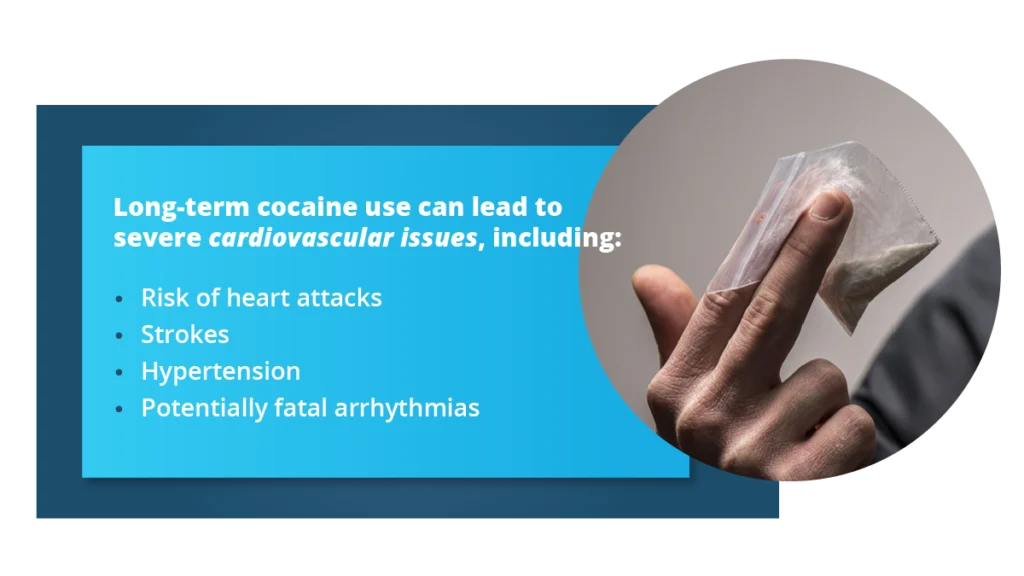Cocaine, a potent stimulant derived from the coca plant, exerts a profound impact on the central nervous system, leading to both immediate euphoria and alarming long-term consequences. Beyond its initial intense high, chronic cocaine use has been linked to a myriad of detrimental health effects.
Understanding these enduring consequences is crucial for fostering awareness, prevention, and effective intervention strategies in addressing the pervasive issue of cocaine addiction.
Key Takeaways
Cocaine is often snorted through the nose, but it can also be dissolved in water and injected. Here’s what you need to know:
- Cocaine is a powerful stimulant drug causing intense euphoria and increased energy by blocking the reuptake of neurotransmitters in the brain.
- Long-term cocaine use can lead to severe cardiovascular issues, including an increased risk of heart attacks, strokes, hypertension, and potentially fatal arrhythmias.
- Prolonged cocaine use can contribute to the development of addiction and tolerance, amplifying the risk of compulsive drug-seeking behavior and making recovery challenging.
Contact The Haven Detox-Little Rock (501) 271-3342 for personalized drug recovery assistance.
Cocaine: History and Overview
Cocaine is a powerful stimulant drug derived from the leaves of the coca plant native to South America. Known for its stimulating effects on the central nervous system, cocaine has a long and complex history. The history of cocaine can be traced back to the indigenous people of the Andes, who chewed coca leaves for their stimulant effects. These leaves were also used in religious ceremonies to link the spiritual and earthly realms. Indigenous peoples in South America, where the coca plant grows naturally, have used it for centuries. However, it wasn’t until the 19th century that cocaine gained global attention. In the mid-19th century, the isolation of the active alkaloids in coca leaves led to the creation of purified cocaine. It soon found its way into various tonics, elixirs, and even soft drinks.
Cocaine gained popularity in the late 19th and early 20th century as a key ingredient in products like soft drinks. However, by the early 20th century, concerns about its addictive properties and negative health effects began to emerge, leading to regulatory measures. The drug’s illicit use rose in the latter half of the 20th century, contributing to social and public health challenges. Today, cocaine is classified as a Schedule II controlled substance due to its high potential for abuse and severe health risks. Despite legal restrictions, it remains a significant global issue, with implications for public health, law enforcement, and international drug policy.
Effects of Prolonged Cocaine Use
Prolonged cocaine use can have significant and wide-ranging effects on an individual’s physical, psychological, and social well-being.

Physical Effects
Long-term cocaine use can lead to various physical health issues. One of the most immediate and noticeable effects is damage to the cardiovascular system. Cocaine can constrict blood vessels, leading to increased blood pressure, a higher risk of heart attacks, and other cardiovascular complications.
Chronic use may also contribute to respiratory problems, as smoking or inhaling cocaine can damage the lungs. Cocaine is a stimulant that affects the central nervous system, leading to increased energy, alertness, and a decreased appetite.
However, people may experience fatigue, insomnia, and a weakened immune system over time. Additionally, persistent cocaine use can result in neurological issues, including cognitive impairments, seizures, and an increased risk of strokes.
Psychological Effects
The psychological effects of prolonged cocaine use are profound and can impact various aspects of mental health. Initially, users may experience intense euphoria, increased confidence, and heightened pleasure.
However, as tolerance builds, individuals often require larger doses to achieve the same effects, leading to a cycle of dependence. Long-term use is associated with a range of psychiatric symptoms, including anxiety, paranoia, and hallucinations.
Cocaine use can exacerbate underlying mental health conditions or contribute to the development of mood disorders such as depression. Cognitive functions such as attention, memory, and decision-making may also be impaired, impacting daily functioning.
Social Effects
The social consequences of prolonged cocaine use are significant and can strain relationships, hinder career prospects, and contribute to legal issues. Individuals struggling with addiction may prioritize drug use over responsibilities, leading to neglect of family, work, and social obligations.
The present study shows that financial problems often arise as cocaine use can be an expensive habit. Social relationships may suffer due to erratic behavior, mood swings, and the strain of dealing with someone in the throes of addiction.
Employment stability may be compromised as individuals struggle to maintain consistent performance and attendance. Legal problems are also common, as the possession and use of cocaine are illegal in many places.
Cocaine Addiction
Regular cocaine use can result in a rapid development of tolerance, compelling individuals to escalate their dosage to maintain the desired effects. The intense pleasure experienced during cocaine use creates a strong psychological dependence, and cravings can be overwhelming, fueling a destructive cycle of abuse.
Cocaine addiction is often characterized by compulsive drug-seeking behavior despite adverse consequences, reflecting the drug’s ability to hijack the brain’s circuitry. Long-term use can lead to severe physical and mental health issues.
Breaking free from drug abuse requires comprehensive treatment strategies that address both the physical and psychological aspects of dependence, promoting recovery and preventing relapse.
Cocaine-Related Deaths
Cocaine-related deaths continue to be a significant public health concern, with alarming statistics highlighting the severity of the issue. According to the World Health Organization (WHO), an estimated 13,000 deaths annually are directly attributed to cocaine use.
The danger is exacerbated by the increasing prevalence of adulterated cocaine, frequently laced with substances like fentanyl, contributing to a rise in overdose fatalities. In the United States alone, the Centers for Disease Control and Prevention (CDC) reported a sharp increase in cocaine-related deaths, reaching over 15,000 in the latest available data.
The socio-economic impact is profound as families and communities grapple with the repercussions of losing loved ones to this highly addictive drug.
Treatment and Support for Cocaine Addiction
The treatment and support for cocaine addiction often involve a combination of strategies to address the physical, psychological, and social aspects of the addiction.
Here are some common support and treatment options for cocaine use disorder:
Detox
The first step in treating substance abuse often involves detoxification, during which the body is cleared of the drug’s toxic effects. Medically supervised detox helps manage withdrawal symptoms, ensuring the process is safe and as comfortable as possible.
Healthcare professionals closely monitor vital signs, provide medications to alleviate symptoms, and offer emotional support.
Inpatient Treatment Programs
Residential treatment programs provide individuals with a structured and immersive environment conducive to recovery. In these programs, individuals reside onsite and receive intensive, round-the-clock care.
This setting allows for a focused and supportive atmosphere where individuals can address underlying issues contributing to their addiction. Residential treatment programs often include individual counseling, group therapy, and holistic activities to promote well-being.
Behavioral Therapies
Cognitive-Behavioral Therapy (CBT): CBT is a widely used therapeutic approach that helps individuals identify and change negative thought patterns and behaviors associated with drug use. CBT can be particularly effective in addressing triggers, developing coping strategies, and enhancing motivation for sustained recovery.
Contingency Management: This behavioral therapy involves providing tangible rewards as incentives for maintaining abstinence. Positive reinforcement, such as vouchers or privileges, is offered when individuals achieve specific treatment goals.
Medication-Assisted Treatment (MAT)
Certain medications can be prescribed to assist in the recovery process. For cocaine addiction, there is ongoing research into medications that may help reduce cravings and prevent relapse. While no FDA-approved medication specifically targets cocaine addiction, medications used for other substance use disorders or mental health conditions may be beneficial in managing co-occurring issues.
Support Groups and Peer Counseling
12-Step Programs: Groups such as Narcotics Anonymous (NA) and Cocaine Anonymous (CA) follow a 12-step model that encourages individuals to surrender their addiction, seek support, and make amends. These programs provide a sense of community and shared experience, fostering peer support critical to recovery.
Peer Counseling: Connecting with individuals who have successfully overcome cocaine addiction can be invaluable. Peer counselors, often in recovery themselves, offer understanding, empathy, and practical insights. Peer support helps individuals feel less isolated and more hopeful as they navigate recovery challenges.
Holistic Approaches
Mindfulness and Meditation: Incorporating mindfulness and meditation techniques can be beneficial in managing stress, a common trigger for relapse. These practices promote self-awareness, emotional regulation, and a sense of inner calm, contributing to overall well-being. Exercise and Nutrition: A healthy lifestyle plays a crucial role in recovery. Regular exercise not only improves physical health but also has positive effects on mood and stress management. Proper nutrition supports the body’s healing process and helps address nutritional deficiencies that may result from substance use.
Frequently Asked Questions (FAQ)
Chronic cocaine use, whether in the form of crack cocaine or cocaine hydrochloride (white powder), can lead to lasting changes in the brain’s reward system. Larger amounts and frequent use pose a high risk of overdose, affecting body temperature and causing serious health problems.
Seeking medical attention for cocaine use disorder is crucial to address side effects and prevent long-term damage.
Cocaine, a potent recreational drug, adversely impacts mental health by rapidly entering the bloodstream. Known by various names, its side effects, including paranoia, hallucinations, and a higher risk of psychiatric disorder, can be severe.
Those grappling with drug addiction should consult a doctor for immediate medical attention.
Regular cocaine use poses severe long-term risks, including high blood pressure, elevated heart rate, abdominal pain, allergic reactions, infectious diseases, and a heightened risk of overdose. Long-term cocaine abuse may lead to coma and even sudden death.
Say No to Cocaine With The Haven Detox-Little Rock
Take the first step towards a cocaine-free life with The Haven Detox-Little Rock.
Our state-of-the-art facilities provide a supportive environment for your healing journey, ensuring a safe and effective detox process. Our residential treatment program employs evidence-based approaches, combining medical expertise with compassionate care to address both the physical and psychological aspects of cocaine addiction.
By integrating personalized treatment plans, counseling, and therapeutic interventions, we empower individuals to overcome cravings and develop crucial coping skills for sustained recovery.Reclaim your life with us today. Contact us at (501) 271-3342 for more information.




